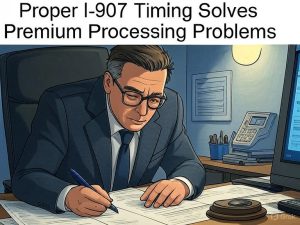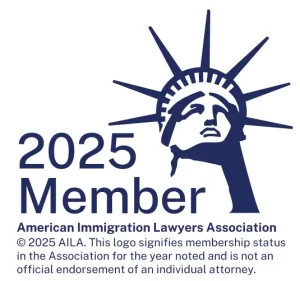
“Why Can’t You Just File Premium Processing Now?”
You’ve just had your H-1B petition filed, and you can see from the tracking that USCIS received it. But now you want to pay extra for premium processing to speed things up, and your attorney is telling you to wait. You might be thinking: “What’s the holdup? Can’t we just send in the premium processing form now?”
This is one of the most common questions we hear from clients, and the frustration is completely understandable. You’re ready to pay the premium processing fee (which can be over $2,800), but there’s a strict USCIS requirement that prevents us from filing it immediately.
The Simple Answer: We Need Your Receipt Notice First
Your attorney cannot file for premium processing until USCIS sends you a receipt notice (Form I-797) for your original petition. This isn’t your attorney being overly cautious—it’s a hard requirement from USCIS that will result in your premium processing request being rejected if ignored.
Why USCIS Requires the Receipt Notice
Think of the receipt notice as your case’s “birth certificate” in the USCIS system. Here’s what that piece of paper provides:
Your Unique Case Number
Every immigration case gets assigned a specific receipt number (like MSC1234567890). USCIS uses this number to match your premium processing request to your original petition. Without it, they literally cannot connect the two applications.
Proof Your Case Exists in Their System
Just because your package was delivered doesn’t mean USCIS has processed it into their system yet. The receipt notice confirms they’ve accepted your case and assigned it to the right service center.
The Correct Filing Location
USCIS has multiple service centers, and your premium processing request must go to the exact same location handling your original case. The receipt notice tells us which service center is processing your petition.
What Happens If We Try to File Without It
We’ve seen well-meaning attorneys try to file premium processing without the receipt notice, and the results are always the same:
- USCIS immediately rejects the premium processing request
- Your premium processing fee gets returned
- You lose valuable time because now you have to start the premium processing process over
- Your case gets more complicated with multiple rejected filings in the record
USCIS is very clear about this: they will reject premium processing requests when they “are not able to match your Form I-907 with the receipt” for your underlying petition.
When You CAN Get Premium Processing
Option 1: File Everything Together (Best Case)
If you know from the beginning that you want premium processing, your attorney can file both your main petition (like H-1B) and the premium processing request at the same time. This avoids the waiting period entirely because USCIS processes them together.
Option 2: Upgrade After Filing (Your Current Situation)
When you decide to add premium processing after already filing your main petition, the process requires:
- Waiting for your receipt notice to arrive (usually 2-4 weeks)
- Confirming which service center is handling your case
- Filing premium processing with the correct receipt number and location
- Starting the premium processing clock (15 days for most employment cases)
Option 3: After a Transfer
Sometimes USCIS transfers cases between service centers. If this happens, you’ll get a transfer notice, and your attorney will need both the original receipt notice and the transfer notice to file premium processing at the new location.
How Long Will You Wait?
For the Receipt Notice
Most clients receive their receipt notice within 2-4 weeks of USCIS receiving their petition. During busy filing periods (like the H-1B cap season), this can take longer.
For Premium Processing Results
Once we can file your premium processing request:
- H-1B, L-1, O-1 cases: 15 calendar days
- Employment-based green card cases: 15-45 calendar days depending on category
- Student work authorization: 30 calendar days
For specific details about these visa categories, see our comprehensive guides to H-1B visas, O-1 visas for individuals with extraordinary ability, and R-1 religious worker visas.
Special Considerations for Religious Organizations
Qualifying religious organizations receive significant benefits in the premium processing system. IRS-designated 501(c)(3) religious organizations typically pay reduced premium processing fees and may qualify for expedited processing even when premium processing isn’t available to commercial petitioners.
For R-1 religious worker cases, this can result in substantial savings while still achieving faster processing times. Religious organizations should always verify their eligibility for these reduced fees when requesting premium processing.
What to Do While You Wait
Track Your Case
Once you get your receipt notice, you can track your case status online at the USCIS website using your receipt number.
Prepare for Premium Processing
Your attorney can prepare the premium processing paperwork while waiting for the receipt notice, so they’re ready to file immediately once it arrives.
Understand the Costs
Premium processing fees in 2025 range from $1,685 to $2,805 depending on your case type, and these fees are in addition to your original filing fees. According to USCIS’s official immigration data reports, premium processing volumes continue to increase annually. The current fee structure was established through a Federal Register rule implementing inflation adjustments.
Set Realistic Expectations
Remember that the 15-day premium processing clock doesn’t start until USCIS receives your premium processing request—not when you decide you want it.
Why This Matters for Your Planning
Understanding this timing requirement helps you make better decisions:
For Future Cases
If you know you’ll need premium processing, ask your attorney to file both forms together from the beginning to avoid any waiting period.
For Business Planning
Factor in the 2-4 week wait for receipt notices when planning start dates or business decisions that depend on immigration approvals.
For Peace of Mind
Knowing this is a standard USCIS requirement—not a delay caused by your attorney—can help reduce anxiety during the waiting period.
Alternative Strategies When Time is Critical
Request Expedited Processing (No Fee)
In truly urgent situations, you might qualify for expedited processing without premium processing fees, though this is much more difficult to obtain.
Plan Concurrent Filing for Future Cases
For clients with ongoing immigration needs, recommend filing premium processing concurrently with initial petitions to avoid this timing issue.
Consider Alternative Visa Categories
Sometimes switching to a different visa category can provide faster overall processing. Our complete guide to US visa types explains all available options and their respective processing times.
Montana, North Dakota, and Wyoming Experience
As an immigration attorney practicing in the Rocky Mountain region, I regularly handle premium processing requests for clients across Montana, North Dakota, and Wyoming. The agricultural and energy sectors in these states often create time-sensitive employment situations where understanding premium processing timing is crucial.
Whether you’re a ranch operation in Wyoming needing seasonal H-2A workers, a technology company in Montana hiring H-1B specialists, or an energy company in North Dakota with urgent O-1 needs, proper timing of premium processing requests can mean the difference between meeting critical deadlines and costly delays.
When Premium Processing Strategy Matters Most
Understanding premium processing timing is just one piece of a larger immigration strategy. Some situations where professional guidance becomes essential:
Multiple Visa Options Available
Choosing between H-1B, O-1, or other categories based on processing timing needs requires understanding the nuances of each visa type and their premium processing availability.
Business Critical Deadlines
When project start dates, contract requirements, or seasonal work demands drive timing decisions, having an attorney who understands both immigration law and business realities becomes invaluable.
Complex Case Factors
Cases involving previous denials, transfers between service centers, or concurrent filings require careful timing coordination to avoid costly mistakes.
These scenarios often benefit from a comprehensive strategy consultation to ensure all timing and procedural requirements align with your business or personal goals.
Red Flags: When to Question Your Attorney
While waiting for receipt notices is normal, here are situations where you should ask questions:
- It’s been over 6 weeks with no receipt notice
- Your attorney won’t explain why they can’t file premium processing
- They suggest filing premium processing without a receipt number
- They can’t tell you which service center will handle your case
The Bottom Line
Your attorney isn’t trying to delay your case or avoid extra work—they’re following USCIS requirements that protect your case from rejection and additional delays. The receipt notice requirement exists because USCIS needs that specific information to process your premium processing request correctly.
While waiting can be frustrating, especially when you’re eager to get results, filing prematurely would only create more delays and complications. A qualified immigration attorney will always follow these procedural requirements to protect your interests, even when it means telling you something you don’t want to hear.
Getting the Right Help
Immigration law is full of procedural requirements like this one that can significantly impact your case timing and success. If you’re working with an attorney who can’t clearly explain these requirements or seems willing to cut corners, it might be time to get a second opinion.
Understanding these rules helps you make informed decisions about your immigration case and sets appropriate expectations for timing. When your attorney explains why something can’t be done immediately, they’re usually protecting you from costly mistakes that could delay your case even further.
Questions about premium processing requirements or other immigration timing issues? These procedural details can make or break your case timeline. Consider consulting with an experienced immigration attorney who can guide you through the process and help you avoid common pitfalls.
